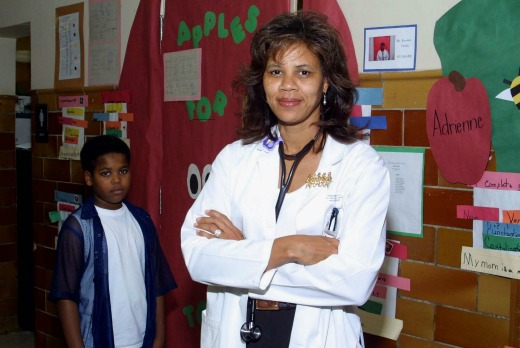The Emory University Department of Pediatrics' Urban Health Program wants to ensure more Georgia students have access to essential primary care in the place where they spend the most time – at school. Veda Johnson, MD, associate professor of pediatrics at Emory School of Medicine and director of the Pediatric Urban Health Program has announced funding for five additional planning grants throughout Georgia.
The grants are funded through a $3 million gift from The Zeist Foundation aimed at helping improve outcomes for at-risk children in metropolitan Atlanta and throughout the state.
The recipients of this year's planning grants represent diverse collaborative partnerships among local school boards, PTAs, business and industry leaders from the communities, district government, health insurers, local hospitals and health providers. Grantees include Clayton County Public Schools, DeKalb County School District, Douglas County School District, Randolph County School System, and Taylor County Board of Education. Five other counties were awarded grants last August.
Partial funding for technical assistance was awarded to the Coffee County Board of Education, Brooks County Family Connection, Emanuel County Family Connection, and McIntosh County Health Planning Board.
The planning grants are intended to stimulate development, collaboration and community discussion to expand the number of school-based health centers throughout the state. "By expanding school-based clinic services, children in Georgia will benefit from improved access to primary health care, improved health outcomes and improved school attendance," explains Johnson. "Additionally, the state will benefit from reduced cost to the Medicaid system through the reduction in inappropriate emergency room visits and hospitalizations for chronic illnesses."
The 2013 Kids Count Data Book - a national study on the well-being of America's children - ranked Georgia children 43rd in the nation for well being. More than 237,000 of the state's children are uninsured with very limited access to routine health care. Of the 1,930 school-based health clinics in the nation, there are now seven in Georgia compared to 224 in Florida, according to the School Based Health Alliance 2010-11 census.
"While these sites increase access to health care for Georgia's neediest children and adolescents through comprehensive school health services, they have also proven to be an important factor in improving school attendance," says Johnson.
Staffed by a multidisciplinary team including nurse practitioners, physicians, clinical social workers, psychologists, nutritionists, dentists, dental hygienists and administrators, school-based health centers provide comprehensive preventive and primary health care services to students on the school campus. Parents are required to sign written consents for their children to receive the full scope of services offered at the school-based health centers.
To date the Emory Pediatric Urban Health Program has awarded a total of 29 planning grants representing 34 counties in the State of Georgia. Additional planning grants may be awarded next year. Successful proposals demonstrate how grant recipients will bring potential partners together in meetings, focus groups and planning teams to develop strategies to improve the health of school students, their siblings, and the surrounding community through the development of comprehensive school-based health services.
For more information, visit the website and Facebook pages at: www.pediatrics.emory.edu/centers/urbanhealth and https://www.facebook.com/EmoryUrbanHealthProgram. Or contact Ruth Ellis at 404 778-1402 email relli01@emory.edu

